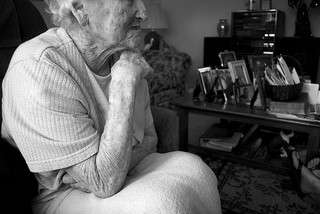Moisturising routine reduces skin damage for elderly

The twice-daily application of a common, readily available moisturiser has been shown to reduce the frequency of skin tears in the elderly by almost 50 per cent, new research shows.
Researchers from the Silver Chain Group, Curtin School of Nursing and Midwifery and Royal Perth Hospital undertook a six-month study with volunteer aged care residents from The Bethanie Group Inc facilities in Western Australia.
Over 900 seniors from high and low care participated, with roughly two-thirds being female and most being over 80 years of age.
Participants were matched into pairs, with half using a commercially available standardised pH neutral, perfume-free moisturiser twice a day on their extremities.
Researchers found that of 424 participants who developed at least one skin tear over the testing period, 60 per cent came from the control group, which had received no standardised moisturising routine.
"Skin tears are the most common wounds found amongst older adults in hospitals, residential facilities and the community, and they are predominantly located on the extremities," says Prof Keryln Carville.
"By 2056 people over 65 years of age will account for 25 per cent of the Australian population, which will potentially result in an exponential increase in the incidence of skin tears and greater demands for health resources.
"Our study determined that the simple and inexpensive application of a pH neutral, perfume-free moisturiser twice daily can substantially reduce these injuries, which highlights the need for standardised protocols and mandatory staff education on skin tears and their prevention."
Prof Carville says skin tears are commonly under-reported because they are perceived to be a normal manifestation of ageing skin, yet they have been associated with chronic wounds that affect and restrict an individual's mobility and well-being.
Research on the problem has been limited to date, though one community study involving Australian veterans aged over 80 years found skin tear prevalence to be 20 per cent.
Prof Carville says myriad morphological and physiological changes are associated with skin ageing, including reduced vascularity, impaired collagen synthesis and thinning of the hypodermis.
The main contributory factor for skin tears in the Perth study was found to be fragile skin, which is largely contingent upon xerosis, or abnormally dry skin.
While findings were positive, Prof Carville says the high number of skin tears in the study indicated that more research is needed to test other interventions to further reduce the impact of these injuries on the well-being of individuals.
More information: Carville, K., Leslie, G., Osseiran-Moisson, R., Newall, N. and Lewin, G. (2014), "The effectiveness of a twice-daily skin-moisturising regimen for reducing the incidence of skin tears." International Wound Journal, 11: 446–453. doi: 10.1111/iwj.12326

















